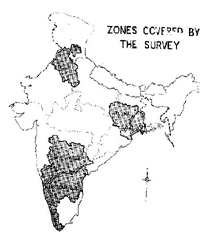1. THE GENESIS
1.2. In the beginning
1.2.4 Planning of national sample survey
For a country as large as India, this sample of one area was inadequate. Reliable information on the magnitude and extent of the disease in the various cross sections of the population was required. This was not an easy task. Apart from resources, trained personnel to conduct large scale surveys was not readily available. In the post-independence period, Pandit Jawaharlal Nehru was eminently suited to harness the patriotic fervour as well as available talent in the country. Raj Kumari Amrit Kaur was the Health Minister and KCKE Raja the DGHS followed by Lt Col CK Lakshmanan, and the recently created TB Division was headed by Dr Benjamin. By any standard, this was a rare combination at the helm of affairs of any country. Even UNICEF and the WHO were eager to provide the required support.
A special committee of the ICMR was set up to address
the issue of obtaining this information expeditiously and rationally.
It decided that a systematic survey on a countrywide basis should be undertaken.
There were many obstacles, technical as well as non-technical. However,
through the government’s efforts all obstacles were removed and the
best of people got to work under the auspices of the TB sub-committee
of ICMR. The pace was hastened by India’s decision to host the International
TB Conference (ITC) to be held in New Delhi, early in 1957. Dr Benjamin
was to be the President. Both the central and state governments cooperated
in this major effort. Necessary money was procured, essential staff recruited
were quickly trained at Madanapalle and New Delhi, where considerable
experience of conducting surveys with MMR was already available. A rigorous
time schedule was prescribed; and the proposed field work was to be completed
in about two years time, i.e., from 1955-57. Seemingly unsurmountable
impediments were somehow overcome. Six teams equipped with mobile X-ray
units and laboratory facilities started field work as per schedule in
six zones. Despite all odds, the field work was completed in two years
time. It took one more year to write the report.
|
NSS Area Map |
